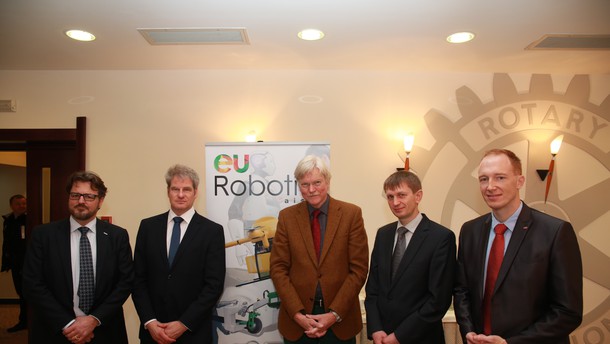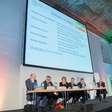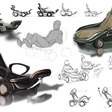
From today's €22bn worldwide revenues, robotics industries are set to achieve annual sales of between €50bn and €62bn by 2020. In the field of industrial robotics, which is currently growing at 8% p.a., Europe's share of the world market is about 32%. Ranking among the well-industrialised countries, Slovenia plays an important part in the development of European robotics with its ability to assume the leading role in setting up a network of "innovation hubs" and its domestic expertise attracting foreign investments.The trends in European robotics development and the latest discoveries will be at the focus of this year's discussions attended by over 500 experts at the European Robotics Forum (ERF2016) in Slovenia, which was selected as host due to its committed involvement in the international research area. The event will take place between 21 and 23 March at Cankarjev dom.
If Europe's share of the world industrial robotics market is about 30%, its position in the world service robotics market represents a share of nearly two thirds (63%). This is the result of its excellence in interdisciplinary research in "intelligent robots" and a culture of cooperation between industry and academia. However, the much larger impact comes from the effect robotics has upon the competitiveness of the manufacturing and service industries that use robotics systems and technologies, and upon the quality of life for citizens. A recent study by McKinsey estimates that the value of the application of advanced robotics in healthcare, manufacturing and services could have an annual economic impact of between $1.7 trillion and $4.5 trillion worldwide by 2025.
Prof. Marko Munih, Head of the Laboratory of Robotics (Robolab) at the Faculty of Electrical Engineering, University of Ljubljana says: "Slovenian robotics is currently comparable to global trends, but investments need to be made in its development. Robotisation generates economic growth; without it there would be no progress and no modern devices that have become an integral part of our lives. The application of robots is still largely confined to industry, where they can replace humans in executing heavy, monotonous and dangerous tasks that often take place in inappropriate and unhealthy environment." Since global industrial robot sales are estimated to grow by 15% on average each year until 2018, Munih adds: "In opposition to general belief, robotics creates new jobs. According to the estimates of the International Federation of Robotics, robotisation will create between one and two million new jobs globally between 2017 and 2020, mostly in the fields of electronics, photovoltaics, electric vehicles, production, sales and food industry."
Slovenia as an opportunity for foreign investments
Yaskawa Slovenija is one of the major European robotics centres as well as a leading global manufacturer in the field of robotics and automation systems. Yaskawa Electric Corporation Japan now operates in twenty-eight countries and employs about 14,000 people. Yaskawa Ristro, the development centre of the corporation for the entire Europe, and Yaskawa Slovenia, both based in Ribnica, Slovenia, generated €28M in revenue last year and currently employ 126 people.
"Yaskawa Ristro is the development centre of the entire Europe. We deliver robotic solutions to as many as thirteen subsidiaries of Yaskawa Europe. Slovenia is also one of potential locations for the setting up of a new manufacturing line envisaged by Yaskava Japan. The investment worth €35M would strengthen our position within European robotics and create approximately 200 new jobs. However, our greatest aim is to expand the Japan-based production of robots and navigation systems to Europe. This will give a boost to our competitiveness and facilitate our conformity with the European standards." Kosler adds that Yaskawa Slovenija collaborates closely with faculties and institutes, that it possesses exceptional expertise and that it also expects government support in facing the highly competitive market situation. "If we are selected to build a new robot manufacturing plant in Europe, this will be the biggest foreign investment in 2016 in Slovenia", the Hubert Kosler, Director of Yaskawa Slovenija, states explains.
The entire robotic community to gather at Cankarjev dom
This year, between 21 and 23 March, Slovenia will host the European Robotics Forum 2016, the most important meeting of the European robotics community, with over 500 participants each year from industry, business, academia, research and relevant European policy makers. The event will be organised by euRobotics AISBL, a Brussels-based international non-profit association for all stakeholders in European robotic sector. One of the association's main missions is to collaborate with the European Commission (EC) to develop and implement a strategy and a roadmap for research, technological development and innovation in robotics, in view of the launch of the next framework program Horizon 2020. euRobotics AISBL was formed to engage from the private side in a contractual Public-Private Partnership, SPARC, with the European Union as the public side. With €700M in funding from the Commission for 2014–2020, and triple that amount from European industry, SPARC is the largest civilian-funded robotics innovation programme in the world.



